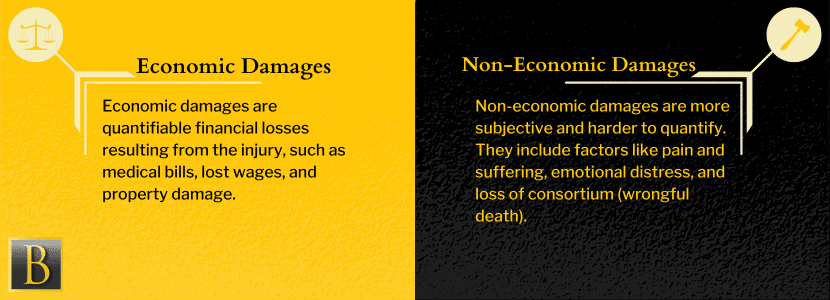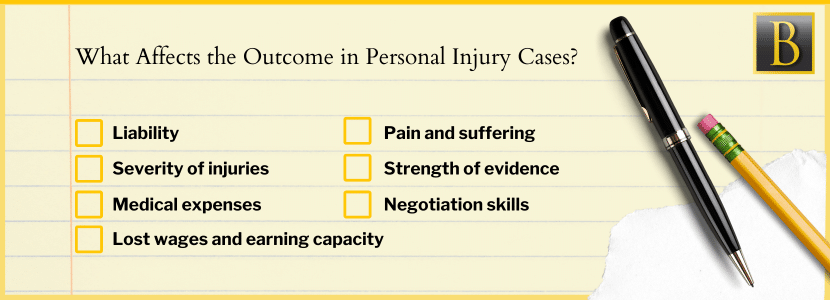If you’ve been injured in an accident, you may be feeling overwhelmed by the legal and financial implications of your situation. You may also have questions about how to file a personal injury claim and seek a personal injury claim settlement for your injuries. Where to start?!
In this blog post, an experienced personal injury attorney will answer some common questions related to personal injury settlements. You’ll learn about compensation claims in personal injury cases, what a personal injury settlement is, and what to expect when you file a personal injury lawsuit in Louisiana.
How Much Compensation Can I Expect From a Personal Injury Settlement?
A personal injury settlement is often case-specific, and it is determined by a variety of factors, such as :
- the severity of your injuries.
- any money you have lost due to being unable to work.
- financial compensation for pain and suffering.
- any medical expenses you have incurred as a result of the injury.
- any other costs you have incurred due to your injury.
The amount of compensation you can expect from a personal injury settlement will depend on all of these factors. It is important to keep in mind that there is no standard or average personal injury claim settlement amount. The specifics of each personal injury case often determine the compensation amount.
A commonly asked question is whether recipients need to pay taxes on a negligence lawsuit payout? The IRS and the state of Louisiana do not require you to pay taxes on personal injury settlements.
What is a Personal Injury Lawsuit Settlement and How Does it Work in the Legal System?
A personal injury settlement is an agreement between the injured party (that is, you) and the responsible party (defendant) or their insurance company to resolve a personal injury claim without going to trial.
In most cases, the plaintiff (the injured party) agrees to accept a specified amount of financial compensation in exchange for dropping their lawsuit against the defendant.
Here’s how personal injury settlements work in the legal system in Louisiana:
Filing a claim
After an accident or injury, you can choose to file a personal injury claim against the responsible party or their insurance company. This claim should include details about the accident, injuries, medical expenses, and any other losses incurred.
A personal injury legal team will gather evidence, help you with all the details, look into each party’s insurance policy and insurance coverage, and overall give you a helping hand getting through the claims process.
Negotiations
Both parties will usually engage in settlement negotiations, either directly or through their respective lawyers. The goal of these negotiations is to reach a fair and mutually agreeable settlement amount.
This process may involve several rounds of offers and counteroffers. This is why it is important to enlist the help of an experienced personal injury lawyer, as they can help you get the best possible outcome.
Settlement Agreement
Once a settlement agreement is reached, both parties will sign a document officially recording the details of the agreement.
This settlement agreement should include information such as how much money is being paid, when and how it will be paid, any other forms of compensation offered, and other terms and conditions of the settlement.
This document may also include a release of liability, in which the plaintiff agrees not to pursue further legal action against the defendant in relation to the injury.
Payment
Once the settlement agreement is signed, the defendant or their insurance company will issue the agreed-upon payment to the plaintiff. This may be in the form of a lump-sum payment or a structured settlement, which involves periodic payments over time.
Dismissal of the lawsuit
After the settlement is finalized and the plaintiff receives their compensation, the personal injury lawsuit will be dismissed.
It’s important to note that not all personal injury cases will result in a settlement. In some instances, the parties may be unable to reach an agreement, and the case may proceed to trial.
However, the majority of personal injury claims are resolved through settlements, as they can save both parties time, money, and the uncertainty associated with a trial.
Why Should I Settle My Personal Injury Claim?
The decision to settle your personal injury claim is a very personal one and should not be taken lightly. Personal injury claim settlements may be beneficial if you want to avoid the risk of litigating in court and reaching an uncertain outcome or if it is clear that you are unlikely to receive a larger award through litigation.
It should be based on a number of factors, including the strength of your case, the amount of money being offered, and the risks associated with taking the case to trial.
You should also consider how much time and resources you are willing to devote to pursuing a trial as well as any potential emotional costs. Trials can be expensive, and slow. Settling your case can significantly shorten the time it takes to resolve your personal injury claim, allowing you to focus on recovery and getting your life back on track.
Ultimately, it is important that you understand all of your options and consult with experienced personal injury attorneys before making a decision about whether or not to settle your personal injury claim.
What are the Common Types of Damages in a Personal Injury Case?
When considering the compensation you can expect from a good personal injury settlement, it’s important to account for both economic and non-economic damages. The total compensation amount will depend on the extent of these damages and how they have affected your life.

Economic Damages
Economic damages are quantifiable financial losses resulting from the injury, such as medical bills, lost wages, and property damage. The more severe your injuries, the higher your medical costs and the greater your lost wages are likely to be. The bodily injury claim settlement you can claim for economic damages will directly correlate with the actual financial impact the injury has had on your life.
Non-Economic Damages
Non-economic damages, on the other hand, are more subjective and harder to quantify. They include factors like pain and suffering, emotional distress, and loss of consortium (wrongful death).
To determine the value of non-economic damages in your case, your attorney may consider similar cases in the past, the severity of your suffering, and any lasting impacts the injury has on your life. The non-economic damages component of a settlement can vary greatly between cases, as each person’s experience of pain and suffering is unique.
In a personal injury settlement, the types of compensation awarded will typically fall into these two categories.
What are the Common Types of Compensation in a Personal Injury Settlement?
Some common types of compensation in a personal injury settlement include the following.
Medical Expenses
This includes reimbursement for any medical treatment you’ve received due to the serious injury, such as doctor visits, hospital stays, medical bills, surgeries, physical therapy, medications, and any ongoing or future medical care.
In cases like car accidents, for example, victims may suffer from physical injuries, such as soft tissue injuries and broken bones, and sometimes require the services of a physical therapist and other types of medical professionals.
Lost Wages
Compensation for lost income can include wages lost while you were unable to work due to your injuries, as well as any diminished earning capacity if you are unable to return to work or perform the same job as before the injury.
Property Damage
If your personal property was damaged in the accident, you may be compensated for the cost of repair or replacement.
Pain and Suffering
This non-economic compensation accounts for the physical pain, emotional distress, and overall discomfort you have experienced as a result of the injury.
Emotional Distress
Emotional distress compensation covers the psychological impact of severe injuries, such as anxiety, depression, or post-traumatic stress disorder (PTSD).
Loss of Consortium
In some cases, a spouse or family member may be eligible to receive wrongful death compensation for the loss of companionship, affection, or support as a result of the injury.
Keep in mind that each personal injury case is unique, and the types and amounts of compensation awarded will vary depending on the specific circumstances. It’s important to consult with an experienced personal injury attorney who can help you pursue the compensation you deserve based on your situation.
How Long Does it Typically Take to Reach an Agreement on an Injury Settlement?
The length of time it takes to reach an agreement on a personal injury settlement can vary greatly depending on the specifics of the case. Several factors can influence the timeline, such as the:
- complexity of the case.
- severity of the injuries.
- extent of the damages.
- willingness of both parties to negotiate.
- agreed-upon personal injury settlement amounts.
In some instances, if both parties are motivated to resolve the matter quickly and amicably, a settlement can be reached within a few months. However, if there are disputes regarding liability or the extent of damages, negotiations may become more protracted, and it could take a year or even longer to reach a settlement. Therefore, the average personal injury settlement time frame depends on numerous factors.
In cases where the injured party is still undergoing medical treatment or the full extent of their injuries has not yet been determined, the settlement process may be delayed to ensure that all damages are adequately accounted for in the final agreement.
While it’s difficult to predict the exact duration of a personal injury settlement process, it’s essential to remain patient and stay in close communication with your legal team. They will be able to provide you with guidance and updates on the progress of your case and help ensure that you receive fair compensation for your injuries.
What Should You Do if You Feel Your Proposed Settlement Is Insufficient?
If you feel that the personal injury settlement amounts offered by the other party are not enough to cover your damages, it is important to discuss this with your attorney right away. They will be able to assess the details of your case and help determine whether or not the proposed offer for your personal injury claims is sufficient.
It may also be possible to negotiate a more favorable agreement if necessary. Remember, an attorney is there to help protect your rights and ensure that you are justly compensated for any losses incurred as a result of the accident. They are skilled at negotiating settlement offers.
In some cases, if the insurance adjuster makes a low but good-faith offer, it may be worthwhile to provide them with additional documentation, such as medical records, receipts, or even expert opinions, to support your claim for a higher settlement amount. This can help show the true extent of your injuries and expenses and may encourage the adjuster to revise their offer.
If negotiations stall or the other party is unwilling to consider a fair settlement, you and your attorney may decide to proceed with litigation. This scenario is not very common. In this situation, your attorney will file a lawsuit, and the case will move forward in court. This may lead to a trial or further negotiations that ultimately result in a higher settlement.
However, it’s essential to keep in mind that litigation can be a lengthy and costly process, so it’s crucial to carefully weigh the pros and cons with your attorney before deciding to proceed.
No matter what happens, it is essential that you speak with an experienced personal injury attorney or law firm if you have been injured due to someone else’s carelessness or negligence.
How Does an Insurance Company Decide to Offer a Settlement?
Insurance companies decide to offer a settlement in personal injury cases by assessing several factors with the primary goal of minimizing financial risk and limiting overall payout while addressing the plaintiff’s claims.
When a personal injury claim is filed, the insurance company assigns an adjuster to investigate the claim, gather relevant information, and assess the extent of the injuries and damages. They also evaluate their policyholder’s liability in the accident.
Insurance companies often look at similar cases and their outcomes to help decide on an appropriate settlement offer. They consider legal precedents and previous settlement amounts in comparable cases. Additionally, they factor in the potential costs of going to trial, as litigation can be expensive and time-consuming.
The adjuster may also consider the claimant’s willingness to negotiate and their expectations regarding a settlement. The insurance company will take into account the expertise and reputation of the claimant’s personal injury attorney as well. If the attorney has a strong track record in successfully litigating similar cases, the insurance company may be more likely to offer a fair settlement to avoid going to trial.
Keep in mind that insurance companies aim to protect their financial interests and may try to minimize settlement payouts. Having an experienced personal injury attorney on your side can be crucial in ensuring a fair settlement offer that adequately compensates you for your injuries and losses.
What Affects the Outcome of Personal Injury Cases?
The average personal injury settlement amount can depend on a variety of factors, which may include any of the following.

Liability
Establishing the fault of the parties involved in the accident is critical. If the defendant is found to be entirely responsible, you’re more likely to receive a favorable outcome. If you share liability, your compensation may be reduced.
Severity of injuries
More severe injuries typically lead to higher compensatory damages, as they involve higher medical costs, lost wages, and pain and suffering.
Medical expenses
Keep track of all your medical expenses, as the total cost of treatment, both past and future, directly affects the compensation amount.
Lost wages and earning capacity
If your injury has affected your ability to work, either temporarily or permanently, you may be entitled to compensation for lost wages and future earning capacity.
Pain and suffering
The physical pain and emotional distress you experience due to the accident will be taken into consideration when determining compensation.
Strength of evidence
Collect and present strong evidence to support your claim, including witness statements, police reports, medical records, and expert testimonies.
Negotiation skills
Hiring an experienced attorney with excellent negotiation skills is crucial for obtaining a fair and reasonable settlement. Negotiating settlement offers takes experience and that is where a skilled legal team can help you.
Being aware of these factors can help you better understand your case’s potential outcome and prepare for the legal process. Keep in mind that every case is unique, and it’s vital to consult with a knowledgeable personal injury attorney who can provide you with personalized advice and guidance.
How and When Are Personal Injury Settlements Paid?
In most personal injury cases, payment for personal injury claims can be made in one of two ways:
Lump Sum Payment
This is a one-time entire settlement payment that covers all of your damages. It’s the most common method of receiving a settlement.
Structured Settlement
In this fee arrangement, the injured party may agree to receive the personal injury payments in installments over a period of time. However, it’s essential to consult with an attorney before accepting a structured settlement offer, as it might not be in your best interest.
Insurance Company’s Role in Settlement Offers
Louisiana follows a fault-based system, meaning the at-fault party is responsible for the damages caused by the accident. You can file a claim with the responsible party’s insurance company, which will try to minimize its costs and resolve the claim quickly.
Keep in mind that the initial injury lawsuit settlement may be a lowball figure that doesn’t cover all of your expenses. Always consult with an attorney before accepting any offer.
Negotiating a Fair Settlement
An experienced personal injury lawyer, like those at The Law Offices of Blaine Barrileaux, can help negotiate a fair settlement on your behalf. It’s not uncommon for the insurance company and the victim to engage in several rounds of negotiation before reaching a mutually agreeable amount.
Receiving Your Settlement Payment
Once you and the insurance company agree on a lawsuit personal injury settlement amount, the insurer will issue a check for the agreed sum. The check may be addressed to you and your attorney’s firm or a health insurance company, depending on the specific situation.
As most personal injury lawyers work on a contingency fee basis, they will deduct their agreed-upon percentage before transferring the remaining funds to a trust account. Once the check clears, your attorney will write a check for your portion and any other relevant parties.
Looking To Speak With a Personal Injury Attorney? The Law Offices of Blaine Barrilleaux is Ready to Help
At The Law Offices of Blaine Barrilleaux, we are dedicated to helping residents of Louisiana who have been injured as a result of someone else’s negligence. We understand how difficult personal injury case settlements can be, and we’re here to help you every step of the way.
Contact us today for a free consultation and learn how we can help you with your personal injury case.







